Success in business depends on unleashing the power of business strategy. It takes a keen sense of direction, a fearless attitude, and the ability to adapt to the constantly changing winds of the business world. Business leaders, economists, and researchers are the right people to impart this strategic wisdom to us.
There is a treasure trove of wisdom and inspiration in these quotes from some of the world’s leading experts. There’s so much to learn about business strategy from these quotes, from differentiation to innovation to vision to experimentation.
In this article, we’ll explore 21 of the most insightful business strategy quotes and find out what they mean. They may inject you with a healthy dose of optimism to help you get through your day.
Table of Contents
Best Business Strategy Quotes Video
Watch our picks for the top 10 business strategy quotes.
Best Strategy Quotes
These are our top picks for best business strategy quotes.
Michael Porter is a well-known economist and business strategist. He’s a Harvard Business School professor and the author of 20 business strategy and economics books, including “Competitive Advantage” and “Competitive Strategy.”.
He popularized the concept of differentiation strategy. Dr. Porter’s differentiation strategy is a way for a company to stand out from its competitors. The goal is to offer products or services that are unique in some way so that the company can charge a premium price and enjoy a competitive advantage.
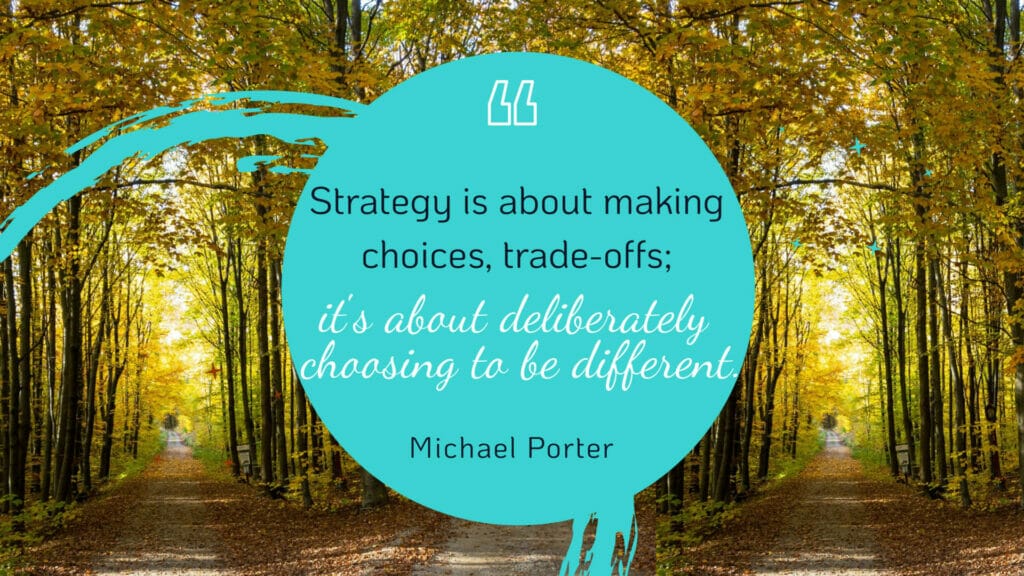
In the above quote, he says the strategy is about allocating resources and focusing efforts to accomplish a goal. Trade-offs or sacrifices are involved when deciding what to do and what not to do.
For example, a company might focus on a few product lines to become the market leader for those products. But, unfortunately, that means they might lose out on diversifying in their quest for a larger market share of a few specialized products.
Here, Porter distinguishes between strategy and operational effectiveness. Companies develop strategies to achieve their long-term goals and objectives. It’s how companies compete in the market and create value for customers.
In contrast, operational effectiveness is how a company delivers its products or services daily. It’s how well and efficiently a company executes its strategy.
According to Porter, operational effectiveness is important, but it’s not a substitute for strategy. If a company doesn’t have a good strategy, it can have outstanding operational performance and still fail. The only way to win a sustainable competitive advantage is through strategy; without a strategy, operational capabilities alone don’t work.
Mark Zuckerberg, the Co-Founder of Facebook and CEO of Meta Platforms, is often credited with this quote. He’s a philanthropist and an entrepreneur. A key part of his leadership style is taking risks, and he believes it’s helped him succeed.
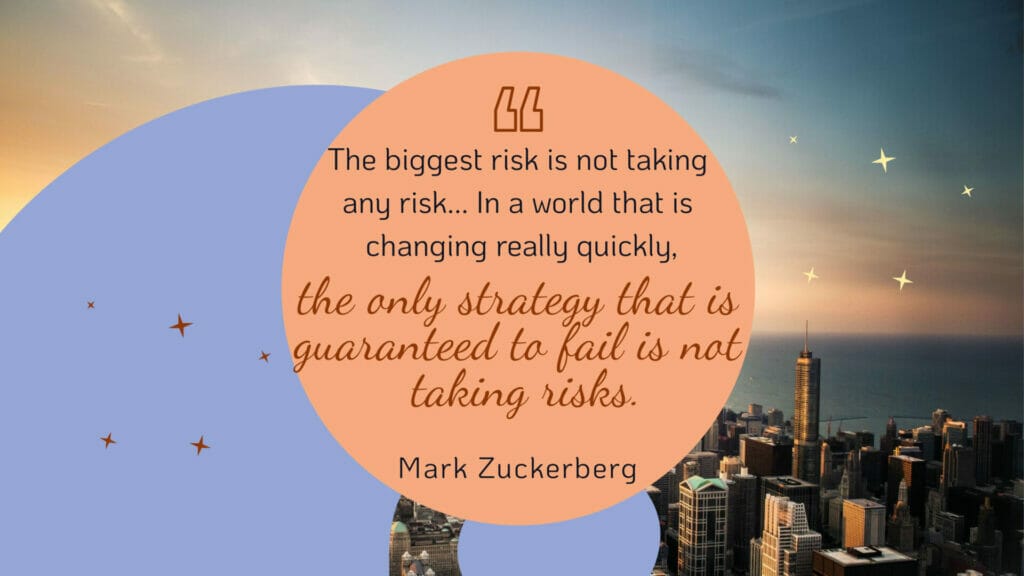
The quote speaks volumes about his entrepreneurial spirit and willingness to take calculated risks in order to succeed. It may seem daunting, but there’s no denying that is sometimes taking a leap into uncharted territory results in greater rewards. The alternative is to stay where you know what works best already.
The only way to stay relevant and competitive is to innovate and stay ahead. If you’re too cautious or don’t take risks, you might fail because you can’t adapt. Taking risks can be nerve-racking, but it can open up new doors.
Many successful companies today use the concept behind this quote – from Apple providing individualized tech support to small restaurants partnering with delivery services.
In the long run, these companies know that investing time and resources into satisfying their current clients will pay off. Increasing loyalty among existing clients attracts new ones through word-of-mouth marketing and positive reviews on online platforms such as Yelp, TripAdvisor, or other review websites.
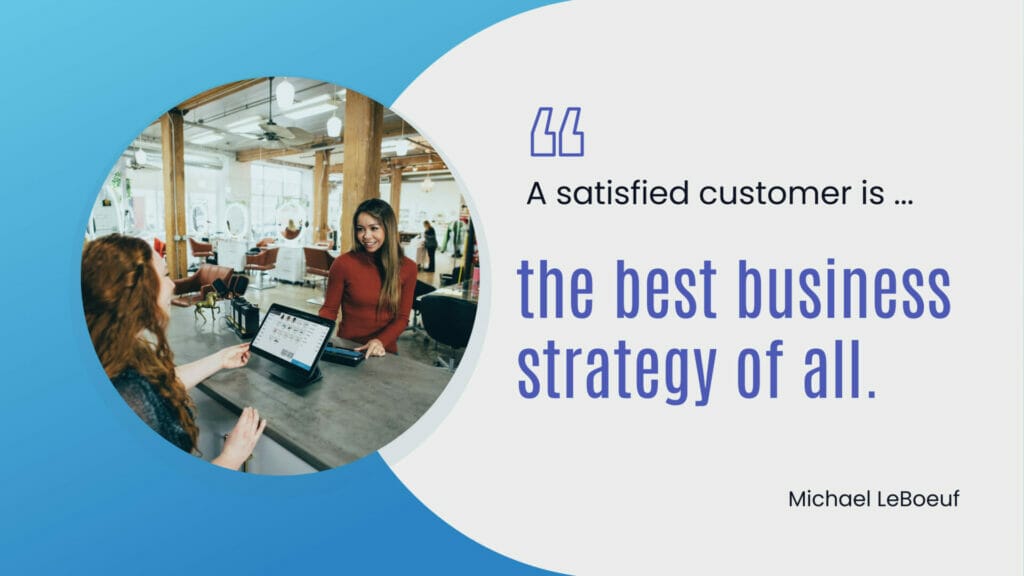
Michael LeBoeuf is an American business author and management consultant. He was a professor at the University of New Orleans. He’s known for emphasizing customer satisfaction as the key to business success.
Dr. LeBoeuf’s published books include ‘Fast Forward: How to Win a Lot More Business in a Lot Less Time,’ ‘The Productivity Challenge and Getting Results! The Secret to Motivating Yourself and Others, and ‘Working Smart.’
In his famous book “Megatrends: Ten New Directions Transforming our Lives,” John Naisbitt predicted the boom in high-tech in the early 1980s. Back then, he recognized several tech trends that were coming up. That’s what businesses and organizations also need in today’s ever-changing business landscape, where disruption is inevitable.
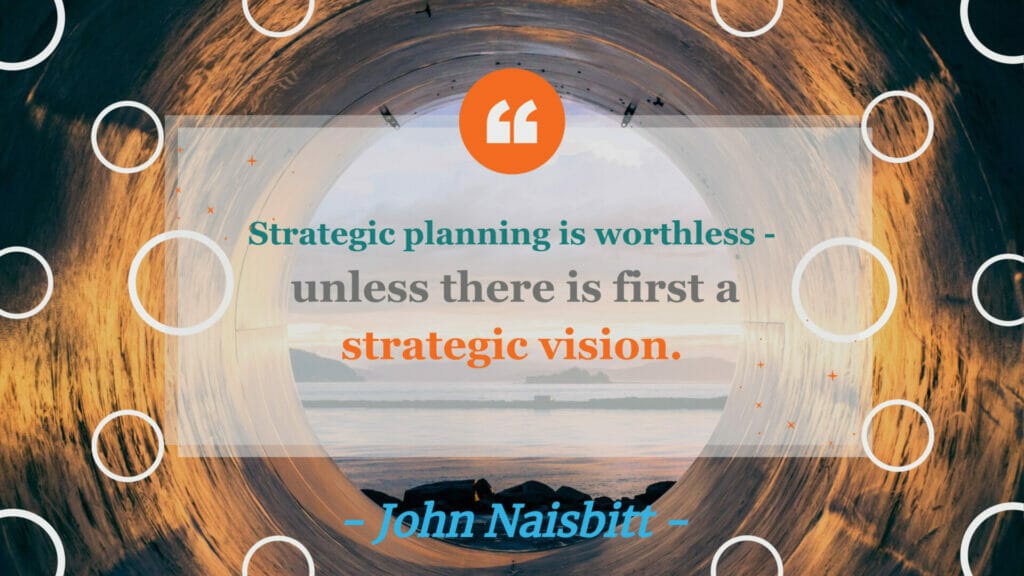
Any successful strategic plan starts with a clear vision. He calls this “strategic vision” – an ambitious, long-term vision of what your company wants to accomplish over time that changes as new changes and opportunities come up. Without it, you can’t set specific goals or figure out how to get there; without direction, strategic planning fails!
This quote by General Peter Pace is a reminder of the importance of considering long-term goals when making decisions. Make sure you plan for long-term success instead of relying too heavily on short-term goals.
We get caught up in the excitement of quick wins without thinking about the big picture. You have to take a step back and figure out how each decision might affect your overall strategy if you want to succeed.
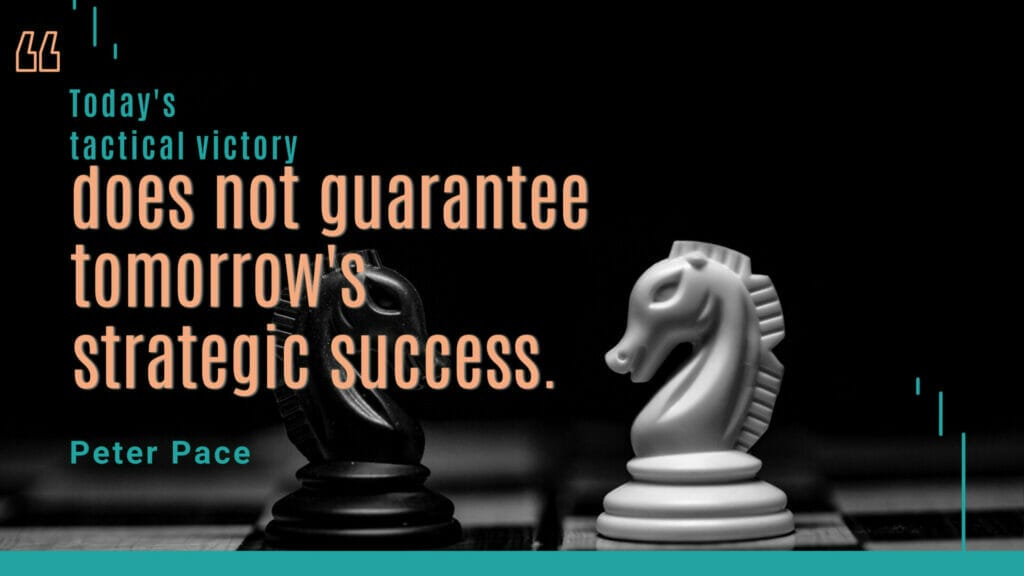
General Peter Pace has had an impressive career as a military leader and public servant. Under President George W Bush, he served as the 16th Chairman of the Joint Chiefs of Staff. Since retiring from active duty service in 2007, he’s served on multiple national security policy boards.
Sun Tzu’s quote speaks volumes about his wisdom and understanding of warfare. He was a Chinese military strategist who wrote “The Art of War” over 2,500 years ago. His words still hold true today as they did back then – that an effective strategy and tactical plan is essential for success in any endeavour or battle.
Tactics are short-term solutions to achieve immediate results, while strategies involve long-term plans designed with larger goals in mind. Each informs the other. If we wish to win whatever battles we face, we should not take either lightly.
Sun Tzu recognized this balance between strategy and tactics long ago, and he realized that combining them could maximize their chances of success. With an understanding of how to prepare for success on any battlefield, he was ahead of his time.
Leaders set trends for others to follow by innovating new products, services, or processes. In contrast, followers imitate what has been done before instead of coming up with something original.
An organization can develop the ability to innovate through research, experimentation and collaboration with other industry partners. However, it requires an open mind from all involved parties if it is going to be successful.
Being on top of current trends will help organizations identify innovations before they become mainstream, giving them the first-mover advantage.
Steve Jobs co-founded Apple Inc., one of the most influential people in modern tech. He was known for his visionary approach and ability to predict and shape industry trends.
Entrepreneur and consultant Michael Gerber, author of “The E-Myth Revisited,” has a powerful message about how Strategy makes Tactical Work easier.
As Gerber points out, in order to maximize their effectiveness, organizations need to focus on both types of work and prioritize them correctly – with a focus on Strategic work rather than Tactical work.
Creating clear plans and sound strategies helps companies create an environment where employees know exactly what to do daily, ultimately leading to success.
Having the right skills is only part of achieving success. You need a well-thought-out plan of action if you want actual results. Without an effective roadmap for where you want to go, success can be difficult or even impossible at times.
It means dedicating time to creating an achievable game plan with attainable milestones along the way. This will help maintain motivation while ensuring steady progress toward desired outcomes.
Jim Rohn was an American entrepreneur, author, and motivational speaker. He’s one of the most influential self-help and professional development thinkers. He wrote several books and gave hundreds of lectures over his five-decade career. His first book, ‘The Art of Exceptional Living,’ came out in 1979.
In this quote, Martha Rogers reminds us to stay in the present. But unfortunately, we usually focus too much on our past mistakes. And it can prevent us from progressing in the right direction.

Professor Martha Rogers teaches business administration at Duke University’s Fuqua School of Business. She is a consultant, author, and speaker. Her specializations are customer relationship management, customer-centric strategy, and customer experience design.
Her work on ‘One-to-one’ marketing with Don Peppers is well known, emphasizing building customer relationships. “The One to One Future: Building Relationships One Customer at a Time” and “The One to One Manager: Real-World Lessons in Customer Relationship Management” are among her books coauthored with Don Peppers.
More Great Strategy Quotes to Inspire You
“Our goal is more modest: We simply attempt to be fearful when others are greedy and to be greedy only when others are fearful.” – Warren Buffett
“It’s easy to forget how little strategic thinking ever gets done in the day. Judging by the ideas generated there, our beds have more of a right to be called our offices than our offices.” – Alain de Botton
“Strategy is not the consequence of planning, but the opposite: its starting point.” – Henry Mintzberg
“In real life, strategy is actually very straightforward. You pick a general direction and implement like hell.” – Jack Welch, former CEO of General Electric
“If you’re clear on what you believe, you have a great foundation to go make a market.” —Ginni Rometty, Chairman, president and CEO of IBM
“Option A is not available. So let’s kick the sh** out of option B.” – Sheryl Sandberg , COO of Facebook
“When a plan or strategy fails, people are tempted to assume it was the wrong vision. Plans and strategies can always be changed and improved. But vision doesn’t change. Visions are simply refined with time.” – Andy Stanley
“In marketing I’ve seen only one strategy that can’t miss – and that is to market to your best customers first, your best prospects second and the rest of the world last.” – John Romero
“Your most unhappy customers are your greatest source of learning.” – Bill Gates
“The only thing worse than being blind is having sight but no vision.” – Helen Keller
“Strategy is simply resource allocation. When you strip away all the noise, that’s what it comes down to. Strategy means making clear cut choices about how to compete. You cannot be everything to everybody, no matter what the size of your business or how deep its pockets.” – Jack Welch
“With the level of uncertainty we see today, more people are asking, how can you develop a strategy in a world that keeps changing so fast? They are afraid that a set of rigid principles will hinder their ability to react quickly. I argue that it is precisely at such times that you need a strategy.” – Orit Gadiesh
“Designing a winning strategy is the art of asking questions, experimenting and then constantly renewing the thinking process by questioning the answers. No matter how good today’s strategy is, you must always keep reinventing it.” – Constantinos Markides
“The essence of strategy is choosing what not to do.” — Michael E. Porter, American economist and founder of strategic management
“By failing to prepare, you are preparing to fail.” — Benjamin Franklin
“If you don’t know where you are going, you’ll end up someplace else.” — Yogi Berra, American baseball player
“Victorious warriors win first and then go to war, while defeated warriors go to war first and then seek to win.” — Sun Tzu, Chinese philosopher and military strategist
“A goal without a plan is just a wish.” — Antoine de Saint-Exupéry, French writer and pilot
Concluding Thoughts
The world of business strategy is ever-evolving, and it takes visionaries like Michael Porter, Steve Jobs, and John Naisbitt to provide insight into how companies can stay ahead. The authors remind us that successful strategies require differentiation from competitors.
Also, a clear vision for personal growth and development is crucial. Innovation in leadership roles holds the key. Alignment of work with the company’s goals and experimentation as a learning process is necessary.
Successful businesses must continuously challenge their existing strategies by questioning them often. Experimentation should be part of the process in order to learn more about what works best for the company’s unique circumstances. Refining your approach is always bold, even when you think you have found something that works well.
Related Articles
Strategic thinking helps leaders set long-term goals and create plans for achieving them. Read More here.
A company needs strategic leaders at all levels to grow and innovate. Here’s more about strategic leadership.